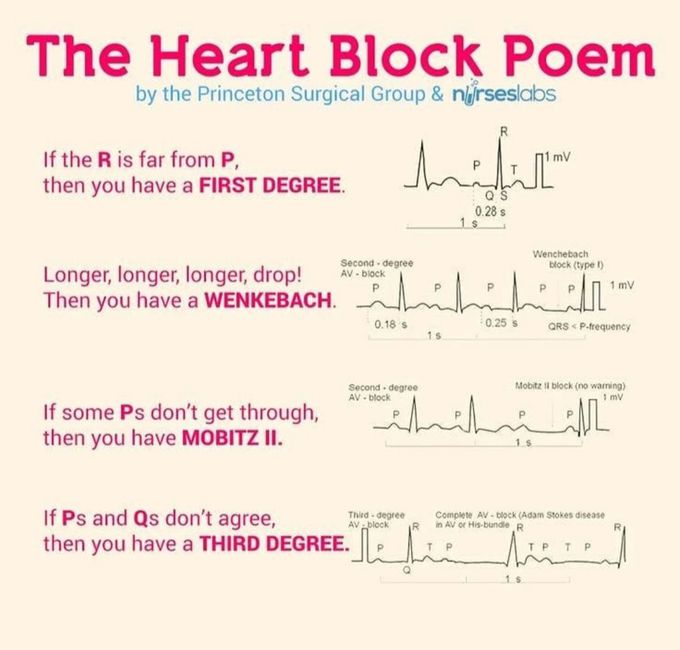


HEART BLOCK POEM-EASY WAY TO REMEMBER
What is heart block? Heart block is a type of heart rhythm disorder (arrhythmia). It is the slowing down or interruption of the electrical signal from the upper chambers of the heart (the atria) to the lower chambers (the ventricles). The electrical signal causes the heart muscle to contract and the heart to beat. A slow heartbeat of less than 60 beats per minute is called bradycardia. Heart block may develop in adults or children. Babies can be born with a heart block if they have a congenital heart defect or their mom has an autoimmune disease like lupus. This is called congenital heart block. Sometimes, no cause can be identified. Types Heart block is classified by how much the electrical signals between the atria and the ventricles are slowed down. There are three types of heart block: First-degree heart block is the mildest form and usually doesn’t cause symptoms. Electrical signals are slowed, but they all reach the ventricles. Second-degree heart block has a slower – and sometimes irregular – heart rhythm. Not all signals reach the ventricles and some heart beats are dropped. Third-degree heart block (complete atrioventricular block) is the most severe form. None of the electrical signals reach the ventricles. A natural back-up system in the ventricles takes over, but the heart rhythm is slower and more irregular than normal. Reference:https://www.heartandstroke.ca/heart-disease/conditions/heart-block
Living with Lupus is often a battle not just against the illness itself, but also against the emotional weight of uncertainty, fatigue, and the toll of long-term medications. For one courageous woman, that battle began in 2013. Diagnosed after Lupus had already affected her joints and internal organs, she was quickly placed on medication that initially helped. But as time went on, her health declined again this time with more frequent flare-ups and increasingly difficult side effects. Like many others with chronic illness, she faced the crushing weight of hopelessness. Each day became harder than the last, and conventional treatments no longer offered the comfort they once did. But in March 2020, at her lowest point, she made a decision that changed everything.Out of desperation and with a healthy dose of skepticism she turned to NaturePath Herbal Clinic, hoping their natural Lupus treatment might offer at least some relief. What happened next went far beyond her expectations.After completing a six-month herbal program, her flare-ups stopped entirely. Her energy returned. The chronic pain that had defined her daily life began to fade. For the first time in years, she felt like herself again. Not just alive but truly living.Her story is not just one of healing; it’s one of resilience, open-mindedness, and the courage to try something new when all else fails. By sharing her journey, she hopes to offer something priceless to others living with Lupus: hope.This treatment has been a true breakthrough for her. If you’re searching for a safe, natural, and effective alternative, I genuinely recommend giving this a chance.”www.naturepathherbalclinic.com or email them at info@naturepathherbalclinic.com




